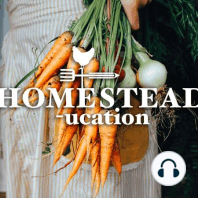53 min listen
Introduction of Birds on the Homestead
FromHOMESTEADucation
ratings:
Length:
63 minutes
Released:
Dec 31, 2021
Format:
Podcast episode
Description
ChickensPurpose: Fresh eggs, fertilizer for the garden, meat, breeding, tick and insect controlCons: Roosters are loud, roosters have spurs, health concerns, dust from scratching, they scratch up grass and gardens, can fly over fences unless wings are clipped, frostbite in cold climatesHousing Requirements: 2-3 square feet per bird, roosting bards, predator-proof coop and run, nesting boxes, access to food and waterDucksPurpose: Fresh eggs, meat, cold climate hardy, slug and snail control, don’t scratch up garden spaces, the only manure that can be directly applied to the garden, domesticated breeds with the exception of Muscovies can’t flyCons: Rooting with their bills, can be loud, wet manure and mess, more mess requires more cleaning/new bedding, heavyweight breeds are more prone to bumblefoot and leg fracturesHousing Requirements: Roughly 4 square feet per bird, no nesting boxes, predator proof coop and run, access to bathing water is ideal, access to fresh food and water, no roosting barsTurkeysPurpose: Meat, eggs, friendly disposition, fertilizer, pest control (eat stink bugs, grasshoppers, ground beetles, snails and slugs)Cons: Large birds require more space and feed, ability to fly, Blackhead illness (chickens can be asymptomatic carriers; ill birds can affect young turkeys which results in death), not as winter hardy, seasonal egg layersHousing Requirements: 5 square feet of space per bird, predator-proof coop and run are ideal with nesting bars, (unless they have a high place to roost at night outdoors), access to food and water, nesting boxesQuailPurpose: Meat, eggs, breeding, small size requires little living space, train hunting dogs, garden fertilizer, quiet, hardy/healthy, don’t need plucking during process, many municipalities that outlaw chickens may allow quailCons: Because so small require protection from small predators like rats, specialized cages and equipment add an additional cost, can’t be mixed in a flock with other birds, lots of waste in proportion to other bird options, manure has to be composted, flying away, quail are known for aggressive bullying within flocksHousing Requirements: 1 square foot of space per bird, wire flooring is essential to allow droppings to pass through, nest boxes required, no roosting bars, access to food and waterGuinea FowlPurpose: Pest control (ticks, snakes, rats, Asian beetles), won’t scratch garden spaces while working, eggs (up to 60 per year for free ranging birds), meat, alarm call for predators/unusual farm activity, roost anywhere outdoors so no coop maintenance is required with the exception of the first three months when constantly enclosed.Cons: Loud, don’t overwinter well since don’t like being cooped up at night, prone to roaming, dumb, they can be hard to find since they sleep anywhere, live up to 15 years, must search for eggsHousing Requirements: 3 square feet of space per bird when cooped up, no nest boxes, roosting bars if being kept in a coop, access to food and waterGeesePurpose: Eggs, meat, down feathers, weed control, pasture maintenance, flock guardians, climate hardy (Sebastopols need shelter), fat renderingCons: Larger size requires more space per bird, loud, some breeds are aggressive, territorial during mating season, seasonal egg layers onlyHousing Requirements: 6-8 square feet per bird, large size-predator-proof coop and run, access to bathing water is appreciated, no nest boxes, no roosting bars, access to food and waterNote: Never use hay or straw for bedding. Urine and wet droppings are not absorbed and ammonia bui
Released:
Dec 31, 2021
Format:
Podcast episode
Titles in the series (44)
Seed Starting on the Homestead by HOMESTEADucation
